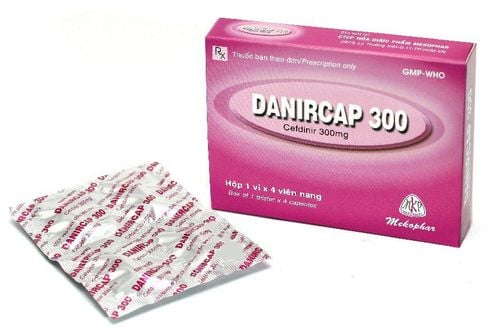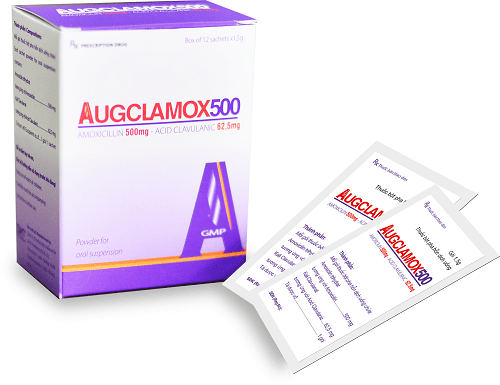This is an automatically translated article.
Danircap 125 contains the active ingredient Cefdinir, a semi-synthetic antibiotic belonging to the 3rd generation cephalosporin group. The mechanism of action of the drug Danircap is inhibition of bacterial cell wall synthesis. Danircap is indicated in the treatment of many types of bacterial infections such as pharyngitis, tonsillitis, otitis media, pneumonia, bronchitis,...
1. Uses of Danircap 125
Danircap 125 contains the main active ingredient is Cefdinir with a strength of 125mg. Cefdinir is a semi-synthetic antibiotic belonging to the 3rd generation cephalosporin group. The mechanism of action of Danircap is inhibition of bacterial cell wall synthesis. Cefdinir is stable to most beta-lactamases produced by Gram-negative and Gram-positive bacteria. Many bacteria are resistant to penicillin and some cephalosporins but are still susceptible to cefdinir. Danircap 125 is indicated in the treatment of the following infections:
Pneumonia caused by Haemophilus Parainfluenzae, Haemophilus Influenzae, Streptococcus Pneumoniae, Streptococcus Pneumoniae. Chronic bronchitis Acute sinusitis Pharyngitis, tonsillitis caused by Streptococcus Pyogenes. Otitis media Uncomplicated skin and skin structure infections caused by Staphylococcus aureus and Streptococcus pyogenes.
2. Contraindications of the drug Danircap 125
Danircap is contraindicated in patients with known hypersensitivity to Cefdinir, other cephalosporin antibiotics or any component of the formulation.
3. Dosage and usage of the drug Danircap 125
The dose of Danircap will depend on the disease to be treated and the patient's health condition. Patients should consult with a doctor for specific indications, should not arbitrarily use antibiotics. Below is a reference dose of Danircap:
Treatment of pneumonia: Adults and children over 13 years old recommend a dose of 300mg every 12 hours for 5-10 days or 600mg every 24 hours for 10 days. Acute sinusitis: Adults should take 300mg every 12 hours or 600mg every 24 hours for 10 days. Children 6 months to 12 years of age: The recommended dose is 7 mg/kg every 12 hours or 14 mg/kg every 24 hours for 10 days, up to a maximum of 600 mg/day. Uncomplicated skin and skin structure infections: The recommended dose in adults is 300 mg every 12 hours for 10 days. Children from 6 months to 12 years old dose 7mg/kg every 12 hours for 10 days, maximum: 600mg/day. Pharyngitis, tonsillitis: Adults should take 300mg every 12 hours for 5 to 10 days or 600 mg every 24 hours for 10 days. Children 6 months to 12 years of age orally 7mg/kg every 12 hours for 5 to 10 days or 14mg/kg every 24 hours for 10 days, up to a maximum of 600mg/day. Acute otitis media: Children 6 months to 12 years of age: 7 mg/kg every 12 hours for 5 to 10 days or 14 mg/kg every 24 hours for 10 days. The maximum recommended dose is 600 mg/day. Chronic bronchitis: Adults and children over 13 years of age 300mg every 12 hours for 5 to 10 days or 600mg every 24 hours for 10 days. Patients with renal impairment: Children with creatinine clearance <30ml/min should receive a dose of 7mg/kg/time/day (maximum 300mg/day). Hemodialysis patients: The starting dose is 7 mg/kg every 2 days in children. As part of the antibiotic Cefdinir is eliminated by hemodialysis, at the end of a dialysis session, an additional dose of 7 mg/kg should be given in children and a subsequent dose every 2 days.
4. Undesirable effects of the drug Danircap 125
When using Danircap 125, patients may experience the following undesirable effects:
Frequency > 10%:
Diarrhea Frequency 1 to 10%:
Dermatology: Skin rash Endocrine and Metabolism: Decreased bicarbonate, increased gamma-glutamyl transferase, increased lactate dehydrogenase Gastrointestinal: Abdominal pain nausea, vomiting Urinary: Increased proteinuria, microscopic hematuria, vaginitis, vulvovaginal candidiasis Hematologic: Leukocytosis eosinophils, leukocytosis, lymphocytosis, thrombocytosis Liver: Increased serum alkaline phosphatase Nervous system: Headache Frequency <1%:
Dermatology: Skin candidiasis, maculopapular rash, pruritus Endocrine: Decreased serum calcium, decreased serum phosphate, urinary glucose, increased serum glucose, increased serum phosphate, increased serum potassium Gastrointestinal: Anorexia, constipation, dyspepsia, flatulence Hematology: Decreased hematocrit, decreased hemoglobin , increased mononucleosis Liver: Increased serum ALT and AST, increased serum bilirubin Nervous system: Dizziness, somnolence, insomnia Musculoskeletal: Asthenia c Kidney: Change in urine specific gravity, increase blood urea nitrogen, increase urine pH
5. What are the precautions when using Danircap?
To ensure safety when using Danircap, patients should pay attention to the following issues:
Superinfection: Prolonged use of Danircap antibiotics may cause fungal or bacterial superinfection. Colitis: Use caution when administering Danircap to patients with a history of colitis. Renal impairment: Use with caution in patients with renal impairment and dosage adjustment as necessary. The safety and effectiveness of Cefdinir in infants younger than 6 months of age have not been established. Therefore, consult a doctor before use. If an allergic reaction to Danircap occurs, treatment should be discontinued and appropriate therapy instituted immediately. Signs of an overdose of beta-lactam antibiotics include: nausea, vomiting, epigastric pain, diarrhea, convulsions,... When there are signs of an overdose of Danircap, patients should immediately go to medical facilities for timely treatment. Hemodialysis is effective in cases of Danircap overdose especially in patients with impaired renal function. Pregnant women: Use caution when using Danircap for pregnant women. Lactation: Cefdinir was not detectable in breast milk following a single dose of 600 mg. In general, infants should be monitored for gastrointestinal disturbances such as thrush and diarrhea when the mother is taking antibiotics.
6. Danircap drug interactions
Drug interactions between Danircap and some other drugs can lead to a change in the effectiveness of treatment or an increase in unwanted effects. Therefore, patients need to inform their doctor of all medicines and supplements they are taking. Here are some notable interactions when using Danircap:
Aminoglycosides: The antibiotic Cefdinir may enhance the nephrotoxic effects of Aminoglycosides and decrease serum Aminoglycoside concentrations. Monitoring is required when the two drugs are co-administered. Antacids may decrease the absorption of Cefdinir. Cefdinir should be taken 2 hours before or 2 hours after antacids containing aluminum or magnesium. Probenecid may increase the serum concentration of cefdinir. Monitoring is required when two drugs are co-administered. Sodium Picosulfate: Antibiotics may reduce the therapeutic effect of Sodium Picosulfate. Consider using an alternative product for colon cleansing prior to colonoscopy in patients new to or concurrently taking antibiotics. The article has provided information about the uses, doses and notes during the use of Danircap. If you need any more information about a drug, you should contact your doctor or pharmacist for advice.
Please dial HOTLINE for more information or register for an appointment HERE. Download MyVinmec app to make appointments faster and to manage your bookings easily.













